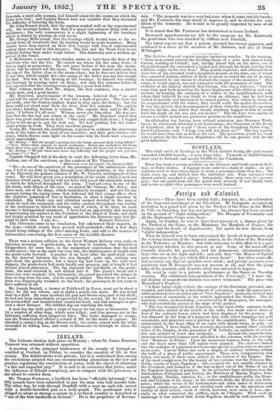IRELAND.
The Liaburn election took place on Monday ; when Sir James Emerson Tennent was returned without opposition.
A meeting of the principal landowners of the county of Armagh as- sembled at Gosford, on Friday, to consider the unsafety of life in that county. The deliberations were private, but it is understood that among the resolutions adopted was one recommending alterations in the law and practice regulating the constitution of juries, with the object of obtaining "a fair and impartial jury." It is said to be notorious that juries, under the influence of Riband conspiracy, are in compact with the prisoners, or are afraid to convict them.
Mr. Thomas Fortesene a landlord, has been "officially informed," that fifty-pounds have been subscribed to pay the man who will murder him. The other day, he rode through Dundalk with a man on each side armed with a double-barrelled gun as a body-guard. The gentleman who is obliged to adopt so strange a course in a civilized country is described as "one of the best landlords in Ireland." He is the proprietor of Ravens-
dale. "The property was in a very bad state when it came into his hands ; and Mr. Fortescue has done much to improve it, and to elevate the con- dition of the tenantry. He is said to be greatly respected by men of all classes."
It is stated that Mr. Fortescue has determined to leave Ireland. Increased apprehensions are felt by the surgeons for Mr. Eastwood, the gentleman who was attacked by ruffians near Dundalk.
The latest reports say that a person arrested has turned approver, and confessed to a share in the murders of Mr. Bateson, and also of Owen M‘Integart.
The Leitrim Journal reports another barbarous murder. In the evening, " three men armed entered the dwelling-house of a poor man named John Curran, residing at Corduff ; and, having placed him on his knees, one of thorn discharged the contents of a loaded gun through his heart, leaving him a lifeless corpse on his own floor ! They quietly departed; and although there were two of the deceased man's daughters present at the time, one of whom was a married woman, neither of them as much as raised the cry of manter, or endeavoured by any means to obstruct the escape of the assassins." This crime, it would appear, was not connected with the poasession of land. The evidence at the inquest showed that Curran, who was a widower, " had for some time past been incurring the heavy displeasure of his children and con- nexions by keeping the company of a widow in the neighbourhood, with whom they believed he was about to form an alliance ; and he had been visited frequently and threatened by armed parties, that unless he broke off his acquaintance with the widow, they would settle the matter themselves. It was also proved, that in consequence of these visits the deceased expressed fears for his life, and stated that should anything happen to him he would leave his death on his son and son-in-law." But the Jury were unable to return a verdict against any particular persons as the murderers.
An ablebodied boy having been refused admission into *Brawney Work- house, he afterwards informed Lord Castlemaine, the Chairman of the Board of Guardians, that he would " shoot some of the Guardians before long." Lord Castlemaine said, " I hope you will not shoot me?" The boy replied, he would have him shot as well as the rest. The precocious youth has been sent to prison by the Brawney Magistrates till he can procure bail for his good behaviour.


























 Previous page
Previous page